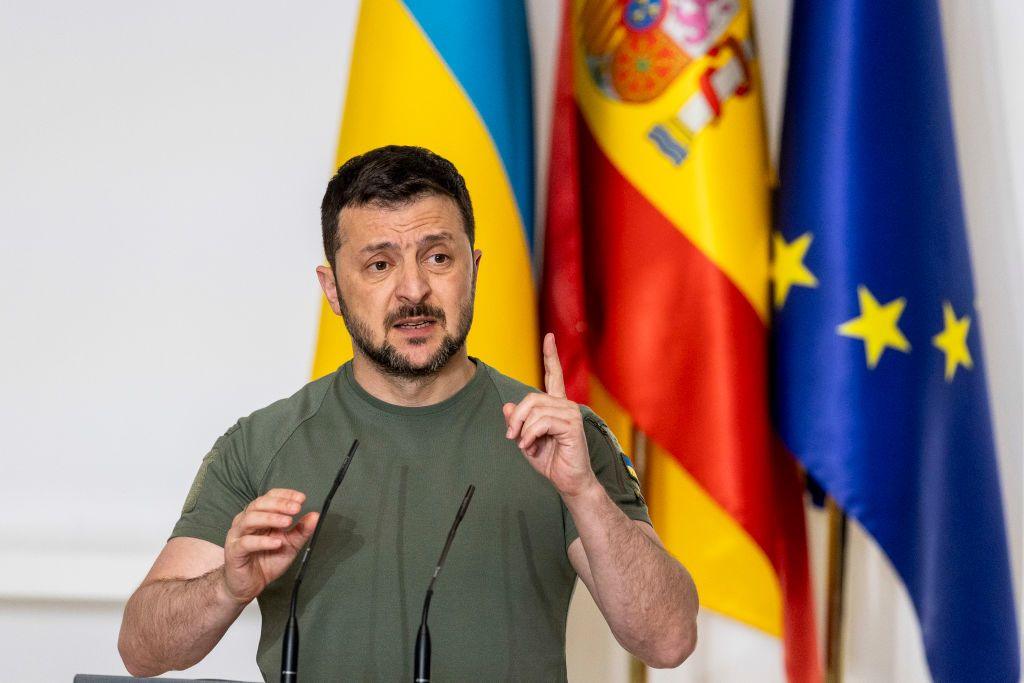Force Russia to make peace, Zelensky urges West

- Published
Ukrainian President Volodymyr Zelensky has urged Western leaders to pressure Russia into peace using "all means" necessary.
Speaking in Spain, Mr Zelensky said there needed to be "tangible coercion of Russia" , which was seeking to "destroy Ukraine and move on".
Mr Zelensky has long said he will not negotiate with Russia directly until Moscow's forces leave all Ukrainian territory, including Crimea.
His call, however, comes as Russia makes gains against Ukraine, with Kyiv suffering from a shortage of Western-supplied weapons.
Russian strike on Kharkiv supermarket kills 12
- Published26 May 2024
Ukraine makes gains in its other war - fighting corruption
- Published22 May 2024
Meet the Peaky Blinders - Ukraine's drone squad defending Kharkiv
- Published26 May 2024
Russia, President Zelensky said, was dropping some 3,200 guided aerial bombs on Ukraine each month.
"How do you fight that?" he asked reporters in Madrid where he met Prime Minister Pedro Sánchez.
The Ukrainian leader rejected the idea of inviting Russia to a planned peace summit in Switzerland next month.
The summit is expected to include representatives of more than 90 countries.
Delegates will try to chart a course for a just and lasting peace in Ukraine based on 10 demands set forth by Kyiv calling for the return of all invaded territory, reparation payments for war-related damages and the creation of a special tribunal to prosecute Russian war crimes, a plan that Moscow has flatly rejected.
Kremlin spokesman Dmitry Peskov says Russian President Vladimir Putin is ready for talks but only "to achieve the objectives now being achieved via the special military operation", as Russia describes the Ukraine war.
In Madrid, Mr Zelensky urged Western leaders to lift bans on donated weapons being used to strike internationally recognised Russian territory.
Most Western countries, including the US, have insisted Kyiv focuses its attacks on Russian forces occupying Ukrainian territory.
"We need to work together and put pressure not only on Russia, but also on our partners to give us the opportunity to defend ourselves against Russia," the Ukrainian leader said.
One of the conditions for receiving billions of pounds worth of aid from Western allies, is for Kyiv to outline its own vision for how this war should end.
It’s why President Zelensky previously published a “10-point peace plan” which includes the complete withdrawal of Russian forces and guarantees against future Russian aggression.
It is what Kyiv has always called for, but the tone has changed.
The summit in Switzerland is generating urgency for President Zelensky. He wants to galvanise international momentum behind his terms.
Until now it has mostly been Ukraine calling for a complete Russian retreat, and the West has tried to support it in that endeavour. The summit could be his only chance to make it a non-negotiable for his allies, too, and keep the negotiating table at bay.
The more nations turn up, the more political pressure could be felt by the Kremlin.
Or at least that is the hope.
Russian President Vladimir Putin has said any kind of peace deal would have to “reflect the reality on the battlefield”. That reality involves his troops continuing to wage a major cross-border offensive into Ukraine’s north-eastern Kharkiv region. More villages are being captured as a result.
As has been the case for the past 18 months, his soldiers are not just capturing territory, they are keeping hold of it. Russia, or Vladimir Putin, isn’t having to compromise on anything, yet.
But what Kyiv argues is that any compromise or grey area plays into Moscow’s hands. It points to previous failed ceasefires during Russia’s decade of aggression, as well as the argument that Mr Putin will want to take the whole of Ukraine eventually, as the world’s gaze turns elsewhere.
Ukrainian commanders are claiming to be in control of the situation, and President Zelensky resuming international travel possibly reflects that.
What will have also fuelled his trip to Madrid, is his constant need to combat war fatigue and secure continued military and humanitarian aid.
An announced $1bn (£783m) package from Spain shows Mr Zelensky’s diplomacy can still bear fruit.
President Putin launched a full-scale invasion of Ukraine in February 2022.